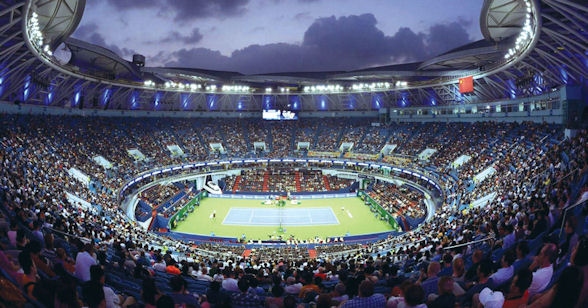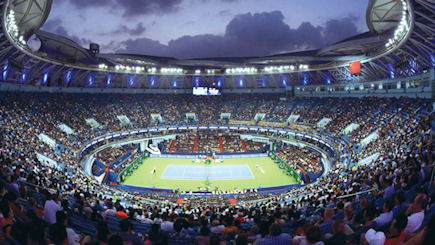This article first appeared in the Nov/Dec 2015 issue of WGM.
History tells us that the best way for traditionally non-Asian sports to break into China is for a Chinese player to become one of the world’s best in that sport. After all, the Chinese naturally love seeing one of their own doing the country proud. Basketball’s Yao Ming, snooker’s Ding Junhui and tennis star Li Na are all examples of Chinese athletes responsible for their chosen sport becoming enormously popular back home. But what other sports could do with a similar boost to help them make it big in the Chinese market? WGM takes a closer look.
MEN’S TENNIS
If the enormous impact Li Na had on the popularity of tennis in China is anything to go by, it’s fair to say the men’s ATP Tour would kill to see a Chinese champion emerge in the coming years.
The “Li Na effect” – as it is known – changed the face of tennis both in China and around the world almost overnight. In 2011, China was home to just two WTA events in Guangzhou and Beijing with combined total prize money of US$4.7 million. Then Li won the French Open and tennis exploded.

Following on from that success and her second grand slam title three years later at the Australian Open, by 2014 China boasted a whopping 10 WTA tournaments on its calendar including a US$2.5 million event in Li’s hometown of Wuhan.
Participation numbers in China rose from just one million when Li first burst onto the scene to more than 14 million by the time of her retirement last year, while of the 330 million who tuned in to watch her French Open victory in 2011 more than a third of them were in China!
While the WTA itself would love to find another Li Na, a male champion would have an even bigger impact competing against the likes of Roger Federer, Novak Djokovic and Rafael Nadal.
The ATP currently has three tournaments in China each year – headed by the Shanghai Masters in late October. Notably, the Shanghai Masters is the tour’s most profitable Masters event in terms of sponsorship dollars and is also a favorite of the players, but it struggles to attract crowds to many of its matches. A Chinese player would certainly change that.
The 1989 French Open champion Michael Chang, who was born and raised in the United States, remains hugely popular in China where his parents were born but a truly home grown great would undoubtedly rocket the sport into the stratosphere.
FOOTBALL
European football isn’t lacking for popularity in China. There are, we’re told, around 100 million Manchester United fans in China alone while it is estimated that more than a third of the English Premier League’s global audience is based in Asia.
Since Liverpool became the first European club to launch a genuine online presence on microblogging site Weibo in 2011, more than 30 others have followed suit as they battle for a piece of the lucrative Chinese pie where football ranks among the most popular spectator sports. And all this despite the nation being historically terrible when it comes to actually playing the game!
![[b]The Chinese Super League is hugely popular but governance problems have prevented it providing adequate pathways for up and coming players[/b]](http://www.wgm8.com/wp-content/uploads/2015/10/images_wgm_1038_chinese-champions-3.jpg)
China’s lack of progress on the football field remains a sore point among its passionate fans, who have seen the national side qualify for the World Cup just once back in 2002. Grass roots development remains largely non-existent while the local Chinese Super League is famously rife with corruption – its shambolic nature another huge hurdle standing in the way of Chinese players progressing to the elite level.
Despite this, tens of thousands continue to cram into stadiums right across the country each weekend simply so they can watch the game they love. Can you imagine if a Chinese player managed to break down the walls and don the red of Manchester United or the white of Real Madrid one day? The money to be made from shirt sales alone would be enough to buy a small nation! But for now, we can only dream.
AMERICAN FOOTBALL
American Football is about as far removed from traditional Chinese sports as you can get, but the prospect of it becoming one of the country’s most popular sports isn’t as far-fetched as you might imagine.
Beijing’s first private American Football sporting club, Great Stone, was launched in 2012 and now boasts around 500 participants – most of them kids who are too big to participate in less “powerful” sports. In the three years since, the number of teams across the country has grown from just three to more than 40.
And with the NFL also working hard to promote the game, the sport’s fan base has grown from just 1.6 million in 2010 to 17.7 million last year.
The result of all this has been the formation of China’s first professional American Football competition – the China American Football League (CAFL) – which is due to kick off in late 2016 with between six and eight teams depending on progress in the meantime.
Although still in its infancy in China, American Football has already seen a handful of promising young Chinese head to the United States to test their skills in the tough US college system. One of them, Ed Wang, was even drafted by the Buffalo Bills in 2010 before injury ultimately saw him cut from the roster a year later.
Although his progress didn’t quite catch the attention of the wider Chinese media, we anticipate sheer pandemonium should someone break the mold and become China’s first genuine NFL superstar!
FORMULA 1
Like just about every major sport on the planet, Formula 1 has spent the past few years looking for ways to capture the imagination of the Chinese public. But with little progress having been made in the 10 years since Shanghai first hosted a leg of the Formula 1 World Championship, it is clear that the only guaranteed way to the hearts of the locals is to give them someone to be proud of.

So where will China’s first Formula 1 champion come from? That’s a good question and one motor sport’s governing body, the FIA, might want to look at more closely. Right now it is tremendously difficult for any driver from Asia to compete with the sponsorship dollars that European drivers can bring to their respective teams as they rise through the ranks – and in the modern age of motor racing sponsorship dollars speak just as loudly as a driver’s individual talents.
It has also been suggested that the Chinese Central Government is reluctant to offer financial support for fear of appearing to aid class division. That means the logical source of money for up and coming Chinese drivers would be the FIA itself.
Again, they’ve also been reluctant to do so in case they’re seen to be favoring one country over another, but let’s face it – the benefits of giving Chinese fans a Formula 1 driver to idolize are surely far too huge to ignore.







